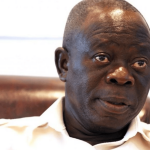…as judiciary suffered reputational damages, so did INEC, if not worse
Chairman of Transition Monitoring Group (TMG), Comrade Auwal Musa Rafisanjani, on Wednesday warned that the credibility of the 2027 general election is already at stake, as the country drifts into a one-party system.
Rafsanjani, who stated this in Abuja during the Public Launch of the Report of the 2023 Election Cycles, acknowledged various successes recorded in the country’s political evolution since the return of democracy in 1999.
These include: the introduction of card readers, BVAS and IReV aimed to improve the transparency and credibility of the process, while legal reforms such as the Electoral Act amendment looked to block loopholes and strengthen the governance of elections in Nigeria.
He said: “The 2023 election cycle is particularly interesting as it represents the election which was supposed to manifest the outcomes of the introductions of BVAS and IReV, as well as legal reforms of the electoral process in Nigeria. Simply put, the 2023 General Election was supposed to become the benchmark for measuring election transparency and credibility.
“While many may ask why TMG is only launching its report midway into the administration that the 2023 election produced, it is critical to understand that political happenings are beginning to show that credible elections in Nigeria would require much more than voter mobilisation, election observation and reporting and even reform of INEC.
“The inherent lessons from 2023 should not be quickly forgotten. Rather, it should serve as reminder to the changes that need to happen to ensure the upcoming 2027 election is better.
“As politicians begin to align and realign their loyalties, as they begin to cross carpet from all political parties to one political party, thereby gradually instituting a one-party system, the credibility of the 2027 election is already at stake.
“The ideals of fair competition that define democracy are already threatened, and the rights of the electorate to choose the best from many, as enshrined in a multi-party democracy as Nigeria being dismantled with the daily weakening of oppositions. Serious questions are glaring in Nigerians’ eyes. Would the 2027 template be different from 2023? What are the lessons from 2023 that must be used to address 2027?”
While examining the roles of the Independent National Electoral Commission (INEC) and the judicial arm of government in the democratic system, Comrade Rafisanjani tasked International Development Partners on the need to roll out their support to ensure viable institutions and organisations with far-reaching capacity are supported to expand their engagements ahead of the 2027 election.
“As the judiciary suffered reputational damages, so did INEC, if not worse. Off-cycle elections in Kogi, Bayelsa and Imo states immediately confronted the new administration and INEC with the opportunity to show Nigerians if the nation was ready to organise free, fair and credible elections. This report is a reminder to us as stakeholders whether those off-cycle elections were any better than the general election or worse off.”
He said: “This report, which TMG looks to launch today, Telescoping Nigeria’s Elections: 2023 Election Cycle in Perspective, looks beyond the conduct of the 2023 general election and throws its light on the judicial process that finally determined the various outcomes of the election.
“More than ever, the Judiciary became an integral part of the elections, with its own credibility coming under severe scrutiny. Questions also emerged as to whether elections should be decided at the polls by the votes of citizens or by the technicalities of court cases.
“As the judiciary suffered reputational damages, so did INEC, if not worse. Off-cycle elections in Kogi, Bayelsa and Imo states immediately confronted the new administration and INEC with the opportunity to show Nigerians if the nation was ready to organise free, fair and credible elections.
“This report is a reminder to us as stakeholders whether those off-cycle elections were any better than the general election or worse off. Ladies and gentlemen, this report highlights the importance of stakeholders’ engagements. For organisations like TMG and other sister coalitions and organisations on democracy, the importance of stretching the engagements for citizens’ involvement as watchdogs cannot be overemphasised.
“The need for citizens to appreciate poor elections as the basis for poor governance must take the top burner to resist attempts of political actors to hijack the process for their personal aggrandisement.
“As politicians strategise to undermine the process, stakeholders must strategise to make the independent choices of Citizens the key deciding factor in our elections. International Development Partners must roll out their support to ensure viable institutions and organisations with far-reaching capacity are supported to expand their engagements ahead of the 2027 election.
“As we launch this report today, we hope that the recommendations serve as pointers to critical changes that are needed to improve the state of elections in Nigeria. For all the commitments of citizens, budgetary provisions, development partners and supports of foreign governments to make our elections better, efforts must be properly channelled to bring about free, fair and credible elections in 2027.”
ALSO READ TOP STORIES FROM NIGERIAN TRIBUNE
WATCH TOP VIDEOS FROM NIGERIAN TRIBUNE TV
- Let’s Talk About SELF-AWARENESS
- Is Your Confidence Mistaken for Pride? Let’s talk about it
- Is Etiquette About Perfection…Or Just Not Being Rude?
- Top Psychologist Reveal 3 Signs You’re Struggling With Imposter Syndrome
- Do You Pick Up Work-Related Calls at Midnight or Never? Let’s Talk About Boundaries






